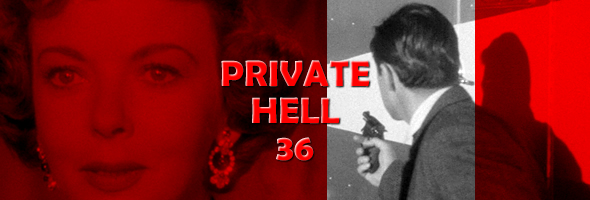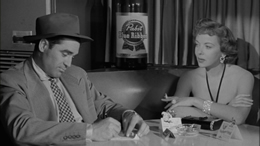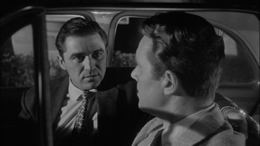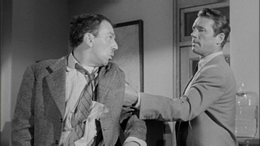


Though the title sounds like an early women-in-prison film, Private Hell 36 is actually an early crime film from director Don Siegel, who actually would make a prison movie the next year with Riot in Cell Block 11 and move on to '50s cinematic immortality with Invasion of the Body Snatchers. However, in the history books it's really considered more of a project for its co-writer, actress-turned-director Ida Lupino, who was one of the first important women to do multiple dut ies behind the camera in Hollywood. Here she appears opposite her real-life husband, Howard Duff, and wrote the script with her ex-husband, Collier Young, who had gone on to marry Joan Fontaine but stuck around to work with Lupino on films like The Hitch-Hiker for their own production company, the Filmmakers. Only in Hollywood.
ies behind the camera in Hollywood. Here she appears opposite her real-life husband, Howard Duff, and wrote the script with her ex-husband, Collier Young, who had gone on to marry Joan Fontaine but stuck around to work with Lupino on films like The Hitch-Hiker for their own production company, the Filmmakers. Only in Hollywood.
Anyway, in the film she plays nightclub singer Lilli Marlowe and is actually romantically attached to another man, Cal Bruner, who's played by swarthy bad boy Steve Cochran (a real-life tough guy and ladies' man who first made it big in White Heat and died suddenly at the age of 48). Cal and his partner, Jack (Duff, natch), are Los Angeles cops who follow the lead of an apprehending robber suspect to uncover a counterfeiting ring. With the aid of Lilli (who got one of the phony bills from a customer she can ID), they embark on a pursuit that ends in a car crash and the discover of a huge stash of marked bills once in the hands of a New York murder victim. Cal muscles the married Jack into going along with keeping some dough for themselves, in large part to impress Lilli, with Cal stashing the loot in a trailer storage rental, number 36. Unfortunately, the police chief also orders th em to track down the missing money, and as you might guess from the title, it doesn't end happily.
em to track down the missing money, and as you might guess from the title, it doesn't end happily.
This may not be much of a directorial showcase for Siegel (who largely lets the camera sit in medium shots apart from some stylish flourishes in the opening and closing five minutes), but Private Hell 36 earns its stripes in other departments. Lupino is always fascinating to watch, especially in films in which she had a hand in the production process, and her chemistry with Cochran is an interesting example of '50s dialogue skirting around production code barriers (including a few jabs involving sexual orientation that still catch viewers off guard today). There's also some great racetrack footage shot at Hollywood Park, which is still thriving today near the airport and often boasts a weird array of musical acts to boot. On top of that you get two notable character turns by the perpetually gravelly Dean Jagger as the police chief and a disorientingly prim Dorothy Malone (who would explode in a heated bag girl frenzy two years later doing suggestive things with a miniature oil derrick in Written on the Wind, earning an Oscar in the process) as Duff's wife.
Given an independent release in theaters before becoming a Republic Pictures asset, Private Hell 36 earned a very unimpressive VHS release in the late '80s and went off the market fairly quickly. Like many mid-'50s films, it was shot open matte but composed for 1.85:1; the Olive Films Blu-Ray (with a DVD from the same master also available) mattes it down to 1.78:1, which basically means you're seeing a little more breathing room on the top and bottom than what was usually visible in theaters. In any case, the compositions look fine throughout. The film itself has sort of a soft and flat look to it with that overlit appearance familiar from many of the era's productions; it's not the most visually dynamic production in the world, but this seems to do a faithful job of approximating how it should look, modest though it may be. Definitely a treat for those who like their noir with a little '50s toughness and strangeness thrown into the mix, with one of the era's best and most dynamic female talents at its center.
Reviewed on August 28, 2012.
![]()